White Christian nationalism is a danger to democracy, critics say. Oklahoma is no stranger to the ideology
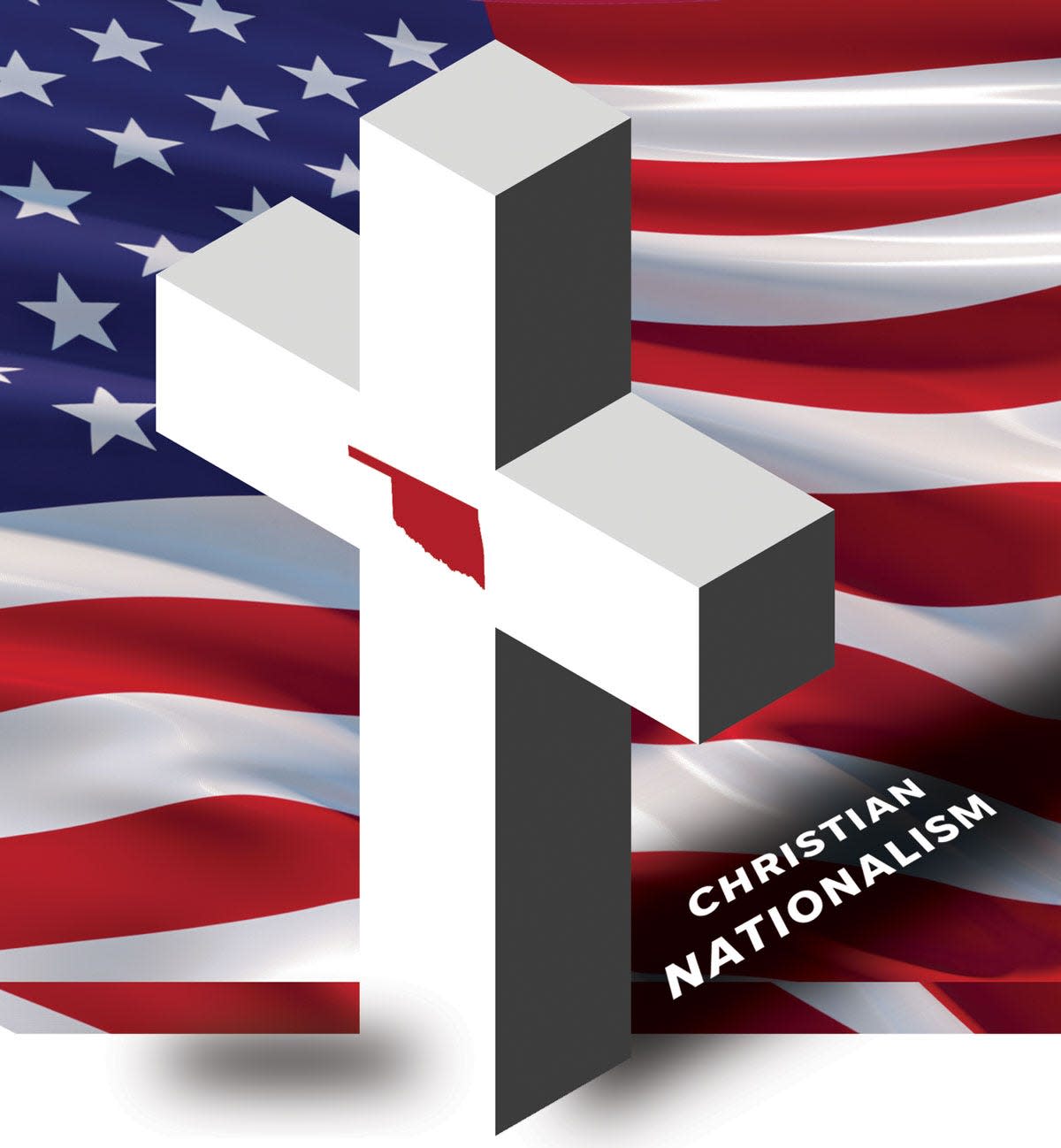
On a recent Sunday, the Rev. Jackson Lahmeyer spoke to a crowd of about 60 people at his Sheridan Church in Oklahoma City, delivering a sermon based on the Book of Acts with his conversational preaching style. On this evening, there was no mention of politics, but his political messaging has helped drive his growing following at this and his first church in Tulsa.
On the side, Lahmeyer runs a group called Pastors for Trump and has made a failed run for the U.S. Senate by unapologetically mixing religion and far-right politics.
Lahmeyer is part of a movement that has steadily grown over the years with what have many have labeled "Christian nationalism," and what harsher critics call "white Christian nationalism."
Blending patriotism and Christianity is nothing new, but concerns have surfaced in recent years tying the combination to an ideology some say is posing a danger to democracy and polarizing an already deeply divided nation.
Oklahoma has become known for this particular mix of allegiance to both faith and country.
Media outlets, including The Guardian, Rolling Stone, Time, The New York Times, and New York Magazine, to name a few, have written about Christian nationalism, and these reports often have prominently featured Oklahomans whose rhetoric associates them with this ideology.
Chief among them is Lahmeyer, whose Pastors for Trump is described as "a nationwide effort to connect Christian faith leaders with the America First movement. Its goal is to secure another term for President Donald J. Trump in 2024."
He's one of the Oklahomans who don't mind being described as Christian nationalists ― but he is quick to say that his idea of what it means to ascribe to the ideology is not the same as the label that he says the "liberal media" has given it.
"I've been labeled one of the leading Christian nationalist leaders out there — I mean, from Rolling Stone to The Guardian in the UK ― you name it, you can just do a Google search," Lahmeyer said. "I lead a great organization called Pastors for Trump and I pastor a great church in Tulsa and Oklahoma City, and the media puts the labels on you, because they try to disparage you or whatever the case may be. It's just part of the game. I understand that that's the role of the media if they need clickbait and so they'll do things like that."
Lahmeyer said some people oppose Christian nationalism largely because the media tells them to. He said his definition of a Christian nationalist is someone like himself who prefers to vote for a fellow Christian who ascribes to the "America first" political strategy.
"It's a Christian who is a nationalist, not a globalist," the minister said.
"I'm a Christian first. My political orientation, however, is to put America first. I believe that the role of the U.S. government is not to take care of every other citizen on the planet, including Ukraine or whatever the case may be. The role of the U.S. government is to take care of to the citizens of the United States of America, so you put America first."
Lahmeyer said people of other faiths aren't criticized for a similar way of thinking.
"As a Christian, my creed is the Christian faith and those are the people that I want representing me in public office. No one takes exception whenever a Muslim wants to vote for a Muslim to represent them in public office," he said. "It's just Christian nationalism that is the problem and it's an unfortunate thing."
What white Christian nationalism is, according to those who have studied it
Critics of Christian nationalism have a different view.
In Oklahoma, Samuel Perry, Ph.D., a University of Oklahoma sociology professor who co-authored the book "The Flag and the Cross," said Christian nationalism should not be misconstrued with Christian patriotism and a Christian's love for the U.S.
Perry said studies have shown that some white Christians think differently about Christian nationalism, and he has focused on what he called white Christian nationalism as a particular threat to the democratic ideals on which the nation was founded. He said white Christian nationalism is an ideology and for some, an identity, that includes the beliefs that America has a special place in God's plan, that the federal government should declare America a Christian nation and that violence may be necessary to get the country back to a hierarchical order in which white Christians are at the top.
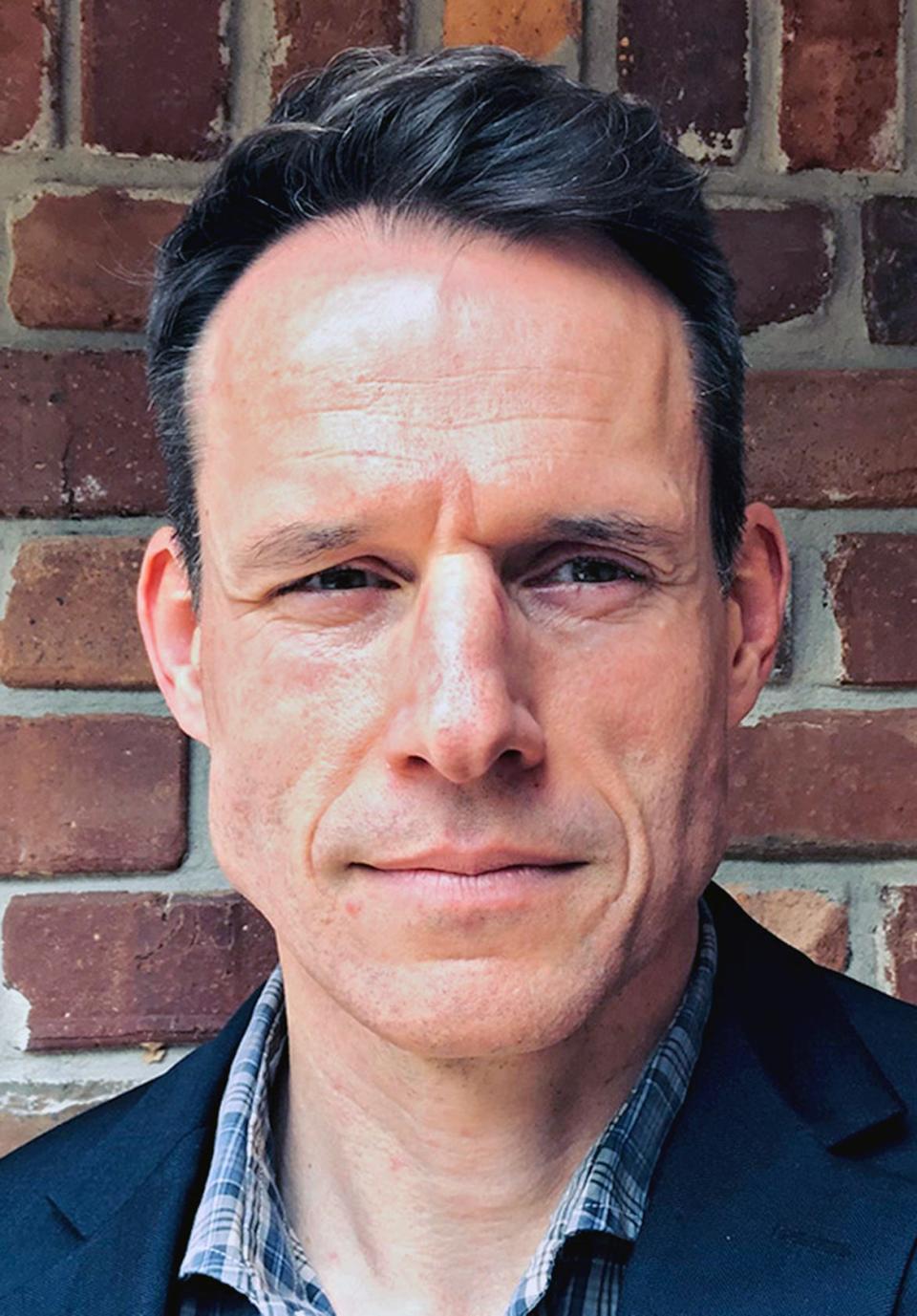
Perry said there is research showing that people who ascribe to the white Christian nationalism ideology are more likely to ascribe to Eschatology, also known as End-Time biblical prophecy, and believe in what he described as fertility regimes such as a concern about "white replacement" and other conspiracy theories that maintained that COVID-19 vaccines have killed more people than the coronarivus.
Christian nationalism, specifically white Christian nationalism, also has drawn criticism from other sources.
"Christian nationalism is a new term for a worldview that has been with us since the founding of our country — the idea that America is destined to be a promised land for European Christians," Robert P. Jones, Ph.D., president and founder of the Public Religion Research Institute, said in his overview of the institute's survey findings on Christian nationalism.
"While most Americans today embrace pluralism and reject this anti-democratic claim, majorities of white evangelical Protestants and Republicans remain animated by this vision of a white Christian America."
More: Ryan Walters calls for Ten Commandments in every classroom, promotion of 'Western culture'
Meanwhile, organizations championing the separation of church and state have singled out some of Oklahoma's elected leaders like state schools Superintendent Ryan Walters for comments and actions they say connect him to Christian nationalism. Walters has endorsed a group called the Oklahoma Advisory Council on Founding Principles and their recommendations for a public display of the Ten Commandments in every classroom and daily prayer in school. Walters, who has called the separation of church and state a "false narrative," did not respond to requests for comment.
'Distorting the Gospel?'
Lahmeyer's name was added to Faithful America's 2023 False Prophets list, along with the likes of U.S. Rep. Mike Johnson, R-Louisiana, recently elected speaker of the U.S. House of Representatives; Texas Lt. Gov. Dan Patrick; and former President Donald Trump. The annual list, released in early December, is a part of the organization's False Prophets Don't Speak for Me initiative that the group's leaders say they launched to help Americans better identify, understand and respond to "anti-democracy" social and religious leaders they accuse of "distorting the Gospel."
Lahmeyer said he isn't bothered that he's on a list of "false prophets" because he considers the label an honor due to his disdain for the group that put the list together.
"I consider Faithful America to be a delusional gathering of individuals who have no scriptural understanding of what true Christianity is," he said. "And therefore, to be attacked by them is a badge of honor."
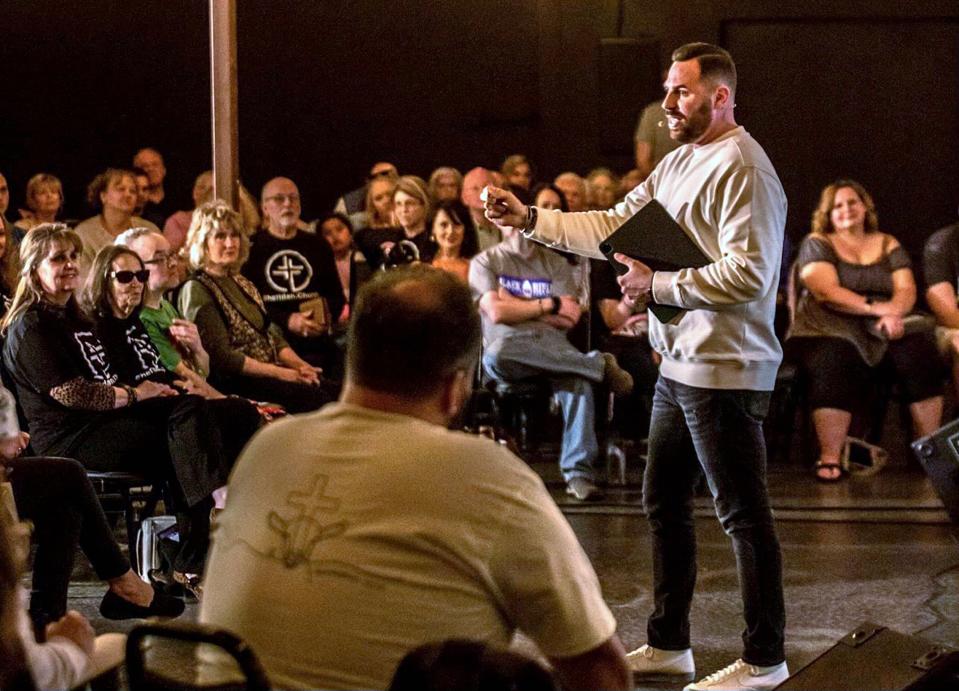
More: Forum: white Christian nationalism What happened at a church forum that focused on white Christian nationalism?
What does race have to do with it?
Lahmeyer said he's aware that some sociologists have identified white Christian nationalism as a form of the Christian nationalism ideology. He said he's also aware that some people have labeled him a white supremacist because of his ideals.
He said being white and a Christian who is a nationalist "doesn't make us domestic terrorists, doesn't make us threats to democracy."
"I'll tell you who the real danger is, and it's the radical Islamic jihadis," Lahmeyer said. "We obviously reject the derogatory label of white supremacist by the liberal media."
Author and Public Religion Research Institute founder Jones said the label is less important than the underlying beliefs. He said society needs labels to describe phenomenon, but the underlying beliefs and behaviors are what are really being described.
This is why his organization asks survey participants if they identify with the underlying beliefs behind white Christian nationalism — questions like "Do you believe that American law should be based on the Bible?" and "Do you believe that the country is designed by God to be a Christian country?" and if Christian beliefs are the only beliefs that really matter.
Jones also said he doesn't see Christian nationalism as separate from white Christian nationalism.
"I believe the most accurate way to talk about it is 'white Christian nationalism,' because it really is this view that historically goes back to the idea that this country was intended by God to be a kind of promised land for European Christians," he said.
The author of the book "The Hidden Roots of White Supremacy and the Path to a Shared American Future," Jones said from its inception, white Christian nationalism ideology has been a blending of white supremacy and Christian dominion.
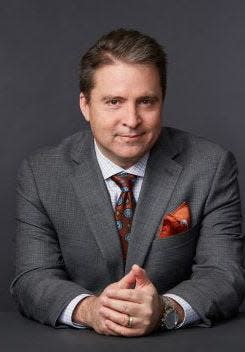
White Christian nationalism is nothing new
Jones holds a Ph.D. in religion from Emory University and a Master of Divinity from Southwestern Baptist Theological Seminary. He and Rachel Laser, president and chief executive officer of Americans United for Separation of Church and State, spoke at a forum about the various forms of Christian nationalism held in November at Tulsa's Congregation B’nai Emunah synagogue. In interviews, both leaders said they were pleased that many Oklahomans are concerned about Christian nationalism.
Jones said to really understand the origin of white Christian nationalism, it's important to understand the version of Christianity that landed on the shores from Europe.
He said in his latest book he traced the ideology back to 1493, not 1492, the year Christopher Columbus arrived in what is now America. Jones said the year 1493 is significant because it was the year Columbus returned to Spain and not only asked for more ships, soldiers and missionaries, but he also asked the Christian Church for a "moral mandate" for the "colonial project."
The Church's response came to be called the Doctrine of Discovery, a set of papal documents issued from the head of the church in Rome. Jones said from the European perspective, the previously undiscovered lands and peoples created a theological crisis. He said there was a question of whether these Indigenous people had rights that Europeans were bound to respect.
The author said the Church basically answered a question with a question: "Are they Christian?"
"And, if the answer was 'no,' then they were labeled 'enemies of Christ' and the Church went on to pronounce that, as enemies of Christ, Europeans had the right to occupy their land, to steal their goods, and, if they resisted, to kill them, or to reduce them to perpetual slavery is what the documents say," Jones said.
"So if we take that seriously, that really does set off the the entire treatment of Native Americans, Indigenous people and the Transatlantic slave trade — these things have their origins in their (Church) moral justification and Christian theology."
"And underneath that is this attitude that we're still struggling with today and this attitude is, to put it really plainly, again, that these lands were designated by God to be a promised land for European Christians," Jones said. "We see that over and over through our history. It's what explains our treatment of Indigenous people, it's what explains white people's assertions that they had the right to enslave others on the basis of the color their skin. Those were Christian arguments being made to justify that, and it survives today."
In March 2023, Pope Francis formally repudiated the Doctrine of Discovery for including concepts that failed "to recognize the inherent human rights of Indigenous peoples," according to a Vatican statement.
Protecting public schools
Laser said Oklahoma appeared on her organization's radar when the Oklahoma Statewide Virtual Charter School Board began considering an application for what would become the first publicly funded religious charter school in the nation.
The Roman Catholic Archdiocese of Oklahoma City and the Diocese of Tulsa applied to open St. Isidore of Seville and the statewide virtual charter school board approved the faith groups' application in October.
Laser's Americans United for Separation of Church and State, along with the ACLU, Freedom from Religion Foundation and the Education Law Center, filed a lawsuit arguing that a publicly funded religious school violates the U.S. Constitution. Oklahoma Attorney General Gentner Drummond also filed suit, saying that the school would violate the Oklahoma Constitution.
More: Oklahoma judge hearing religious charter school suit rejects motion to remove himself from case
"Lately, Americans United has been very busy filing lawsuits and opening investigations in Oklahoma because the state has been undermining church-state separation in a very dangerous way, in violation of its own constitutional promises," Laser said.
She said public schools must be secular and serve all people, and they should "never become Sunday school."
"This is about whether this nation and Oklahoma specifically will allow Christian nationalists to take over all public schools — because forcing taxpayers to fund religious public schools is un-American, a breach of church-state separation and an affront to public education," Laser said. "And, let's not forget that public schools educate the majority of our children, they educate the majority of Black and brown children in our country so this is an issue of racial justice, as well."
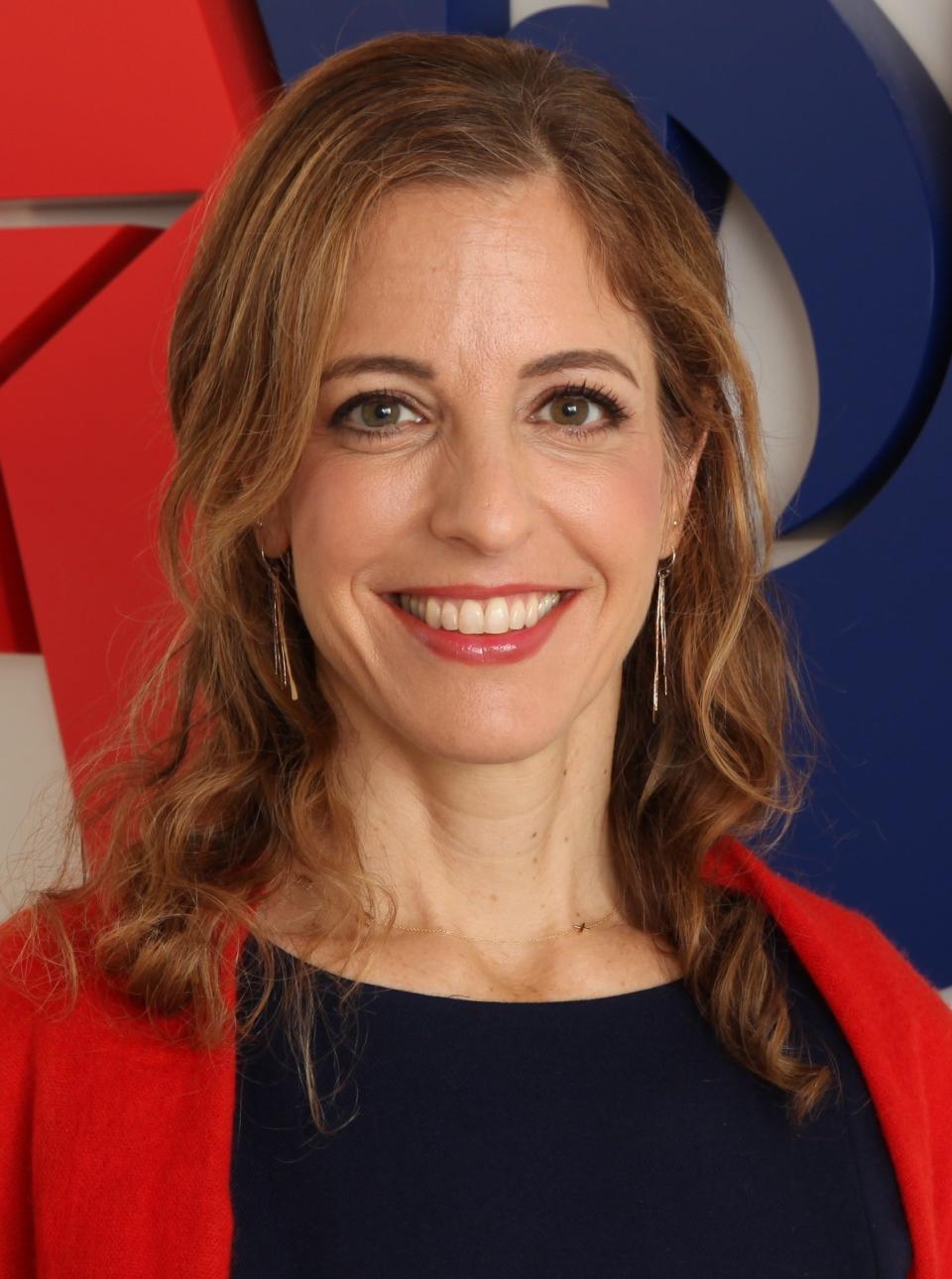
Showing concern and sounding the alarm
Laser said the recent "energetic gathering" of about 200 Tulsa religious leaders from diverse faith traditions, atheist leaders, lawyers and activists showed how much people are concerned about Christian nationalism, which she defined as the belief that America was made for European Christians and that U.S. laws should codify that privilege.
Laser said she and her organization are sounding the alarms bells about Christian nationalism in its various forms.
"I think people need to wake up to just how many issues they value are supported and held up by church-state separation," she said. "If you care about reproductive freedom, if you care about LGBTQ(+) equality, if you care about racial justice, if you care about the rights of religious minorities and the non-religious, if you care about the right of our children to read and learn, if you care about the American democracy, then you're a champion of church-state separation — you just might not know it yet. Without it, America wouldn't be America."
Jones said it's critical that people become more informed about white Christian nationalism.
"Democracy is a commitment to a set procedures, a set of fair procedures where everyone has equal representation, everyone has an equal chance to participate — and the outcome is not a foregone conclusion in a democracy ― the outcome is a result of a free and fair process," he said. "What we've seen among white Christian nationalists is they're not committed at all to a free and fair process. They are committed to a predestined end."
What can individuals troubled by white Christian nationalism do to combat this ideology?
Perry, speaking recently at Disciples Christian Church (formerly Edmond Trinity Christian Church-Disciples of Christ) in the north Oklahoma City metro area, said one way to face this challenge is to avoid the kind of "silos" that result from only interacting with people who share one's views. He said it's important to be open to talking to people who may ascribe to different ideologies and to keep the lines of communication open.
Jones said he thinks America may move beyond the division created by white Christian nationalism if it effectively comes to terms with the country's origin story. The issue, he said, has come to a head, particularly after the election of the nation's first Black president, Barack Obama, and when national statistics began showing a national demographic shift in which white Christians would no longer be in the majority.
"I think that we have to start with getting an honest reckoning with our past," he said.
"There's two visions of the country here that are mutually incompatible. Are we a pluralistic democracy, where everybody stands on equal footing before the law, regardless of race or religion or are we a divinely ordained promised land for European Christians?"
Jones said he thinks America is only now starting to truly grapple with this reckoning.
"I think if you're kind of putting it in a Christian frame, you can't really get to repentance, repair and other kinds of actions until you fully sat with the confession part," he said. "And I think we are just barely beginning to tell the truth, to confess on that path toward repentance. We just got our first couple of steps down that road."
This article originally appeared on Oklahoman: What critics say white Christian nationalism looks like in Oklahoma

